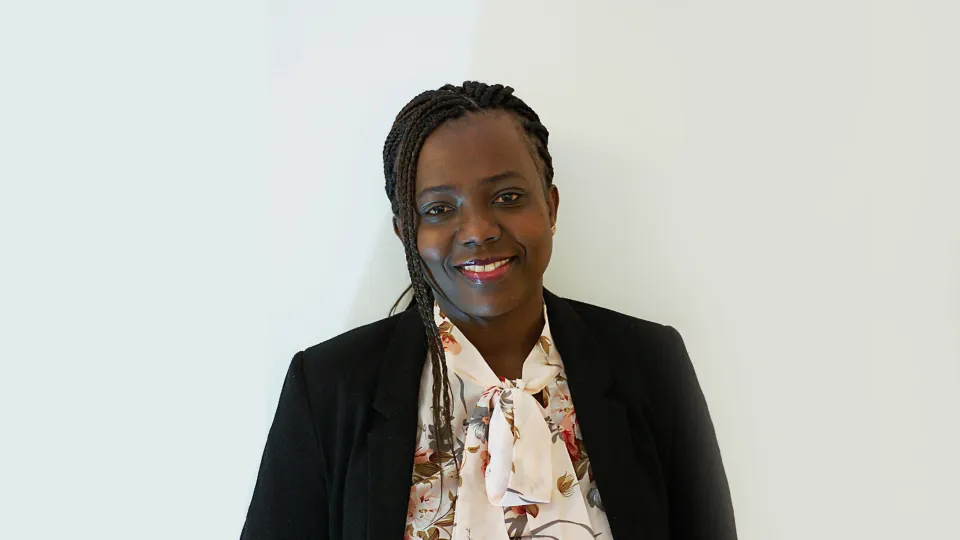Betty, why did you choose to pursue a doctoral education?
“Funny enough, a PhD was never my dream. After my undergraduate studies, I worked in industry for quite a while and only decided to return to school to further my education mainly for career growth. But during my master’s studies, I found myself genuinely enjoying the research process. There was a kind of fulfilment in asking deeper questions, exploring ideas, and contributing to knowledge in a way that felt meaningful. That’s when I realised a PhD was something I wanted to do, mainly because the work itself resonated with me.“
What is your research about?
“I’m researching digital transformation in healthcare, specifically how people, systems, and technologies are coordinated in complex digital health ecosystems. Despite all the technological progress, healthcare systems still struggle with innovation and interoperability. My work looks at why that is.
It’s not just about having the right tools like EHRs or telemedicine platforms; it’s about how these tools are actually embedded in everyday practices, policies, and institutional arrangements. I focus on both national healthcare systems and local digital platforms. The goal is to understand how we can build digital health ecosystems that are not only functional, but also responsive, and more effective for the people they’re meant to serve.“
Why did you choose the Department of Informatics at Lund University?
“Well, first of all, Lund University has a long-standing reputation for excellence in research. What drew me to the department of Informatics was its focus on the intersection of technology, society, and organisations, which aligns perfectly with how I think about digital health. The department creates space for that kind of interdisciplinary work, which was important for me.
But honestly, it was also the people. From the beginning, there was a genuine sense of academic freedom. They were curious, open, and encouraged me to develop my own questions and I really appreciated that.“
What is it like to be a doctoral student in Sweden?
“From what I gather, doing a PhD in Sweden is a bit different from many other places. Most PhD students here are actually employed by their universities, which means a stable income, full social benefits, and access to the healthcare system which is quite stabilising.
You also get to work closely with experienced supervisors in an international, collaborative environment that does not only prioritise your education but also your personal well-being not just as a researcher, but as a person.
Plus, Sweden offers a unique work-life balance, you can do meaningful research and still have time to enjoy your life outside the school. My friends and family will definitely disagree with this though :-)“
Can you describe a typical day as a doctoral student?
“A typical day varies but lately mine have started with panic.. and then coffee :-)
Seriously: Lots of coffee, from there, it’s a mix. Some days are quiet and solitary with reading, writing and analysis. Other days are filled with meetings, teaching, classes or presentations. Basically, no two days are ever the same. In a way, we get to learn the balance between research, teaching, and everything in between.“
What’s the best part about being a doctoral student?
“The best part about being a doctoral student is the intellectual freedom. You get to pursue questions that genuinely interest you and contribute to conversations that you care about. You also get to train with leading scholars, participate in top conferences, and be part of a global academic community. And of course, the travel is a definite bonus! Getting to experience new places while doing work you care about is a privilege I don’t take for granted.“
What’s the most challenging part about being a doctoral student?
“One thing I’ve heard often from mentors is “trust the process”, but honestly, that’s one of the hardest parts. Because I feel like research can be very slow and uncertain, and sitting through these ambiguities is a hard ask for me. Also, a lot of the PhD journey is about self-pacing and self-initiative, and with that freedom comes responsibility. You’re essentially the project manager of your own work, often juggling side projects, writing deadlines, teaching, and your thesis silently 'watching you'. It can be overwhelming, learning to manage that balance and to stay focused even when things feel unclear, has been one of the most challenging, but also most formative, parts of the experience.“
What advice would you give to someone considering applying?
“My advice? Be vulnerable. That’s my recent favourite word. Be willing to admit that you don’t know everything, in fact, be ready to discover how much you don’t know. That kind of vulnerability opens the door to genuine curiosity, and it’s been one of the most transformative attitudes I’ve developed during my PhD journey. I’ve learned to embrace the discomfort of not having all the answers, and in doing so, I’ve opened myself to entirely new areas of thought.
Lastly, I’ve been fortunate to be in a department that offers a supportive environment where this mindset is welcomed and nurtured. But it’s also important, especially during the interview process, to make sure there’s a good fit with your supervisors, not just in terms of research, but in how they support the kind of growth you’ll need.“

